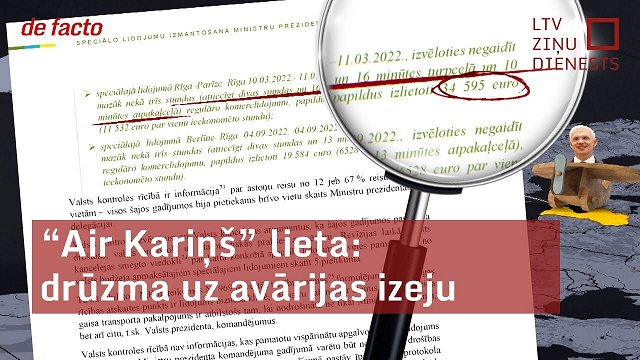One of the articles of the Law on Disclosure of Interest Representation, which came into force at the start of the year, states: "When submitting a draft of a public decision or a proposal for it, the representative of the public authority shall indicate the interest representation activities that took place during the initiation or development of the draft of a public decision. If during the preparation of the proposal interest representation activities have taken place, they should also be reflected in the table of proposals for the consideration of the draft law, in the report on the objections expressed in the opinions or in other similar documents in cases where such documents are to be prepared in accordance with the regulatory enactments."
De Facto pointed at several cases where lobbying of one kind or another might have taken place, but does not appear to have been recorded. But whether this actually breaks the rules of the lobbying law is unclear, because it may be possible that simply mentioning lobbying contact during a parliamentary debate might be sufficient.
"I cannot say that this law is perfect, that it is very good, that there are answers to all questions. The most important thing about this law is that it means that we are forced to think about how to further improve it, because for 10 years there was a situation that there was nothing (...) In my opinion, it would be very good if those who are professionally engaged in lobbying, if they, for example, reported what money they received for representing what interests," said Saeima member Andrejs Judins (New Unity).
The most important part of the lobbying law, which will require lobbyists to officially register, will not come into force until the fall of 2025.
Saeima deputies from the Progressives, New Unity and Greens and Farmers Union political groupings spoken to by De Facto voiced their willingness to set up interim public lobby registers before the official start date – though none have yet done so.
Anti-corruption expert Valts Kalniņš admits that if there are no precise instructions on how to fulfill the provisions of the new law, then each institution must find its own solution on how to do it.
One easure could be a publicly-available calendar, recording who factions or individual MPs meet with.
"Each institution must find its own solution so that the legal norm is fulfilled. So that it can be fulfilled as simply as possible with fewer complications. (..) It would be wonderful if the Saeima could, for example, collect information about all interest advocacy activities in one place, which have happened, but this would be some kind of step that exceeds the minimum that the law specifically requires," says Kalniņš.
When the law came into force, a seminar was organized for the deputies with the participation of experts to explain the new norms. However, even the experts could not provide answers to many questions. The Speaker of the Saeima, Edvards Smiltēns (United List), is ready to criticize the law, but does not promise that the Saeima will develop guidelines for MPs.
"The law is declarative, it is extremely abstract... I believe that if adopted, then laws adopted by Saeima should be understandable, clear, enforceable, and it is also clear what happens if these laws are not followed. Unfortunately, this law does not include that," says the Speaker of the Saeima.
Both Smiltēns and several other MPs state that they also ensure openness through other types of publications, such as posts on social networks. "The first and most important thing is that if there is any businessman with us, I think that we will reflect on social networks, which in turn is a public calendar where everyone can see, including the public and our voters," says For Stability! leader Aleksejs Roslikovs.
Ainārs Šlesers, leader of Latvia In First Place also argues that social media posts can in effect constitute a form of register of meetings and lobbying encounters.
Though the lobying law is already on the books, the current Cabinet of Ministers now has until September to create the Interest Representation Register and its rules of operation. And then another two years will be allocated for its practical implementation.
It is expected that the implementation of the register of lobbies will cost around one and a half million euros. After that, it will need about three hundred thousand euros every year to maintain.




























